2022 Orientation: Neighborhood/Community Organizing
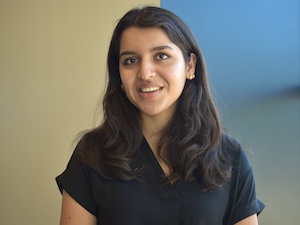 Aiman Altaf | 29th Street Community Center
Aiman Altaf | 29th Street Community Center
Having never lived in the US before college, my only exposure to the extreme social issues here was the occasional BBC story. Beyond that, I arrived wide-eyed, knowing only that I was going to do my undergrad at my dream school, in a city that my dad had told me had a high crime rate. The first I ever heard about Baltimore’s history was in Intro to Public Health during freshman fall, where we were introduced to the Baltimore Butterfly, redlining, and social determinants of health. The following year in Intro to Bioethics, I learned about the unethical research studies Hopkins had done using community members as participants without consent, most infamously Henrietta Lacks and the Baltimore Lead Paint Study. And the next semester in Intro to Sociology, I learned about why inequalities persist and how difficult social mobility is in the US.
Though I was really interested in these issues, as evidenced by the books and movies I was consuming, I found myself getting increasingly drawn into the pre-med and GPA-oriented pools of students at Hopkins. Over the last few months, as I passed the halfway point of my undergrad journey, I was questioning what my goals and purpose are in life. I wanted to make sure that Baltimore was more a part of my journey than just Hopkins. I didn’t want to come here for three years, get my diploma, and just leave.
CIIP orientation was such a welcome break from that Hopkins culture and was the highlight of my year, and I can’t emphasize that enough. There are two parts to that.
One, I really got to dive into Baltimore’s relationship with Hopkins, and the ways that Hopkins has systematically used, taken from, and destroyed the surrounding community for their own and their students’ gain. This was a difficult reality to grapple with, because many of us hold a lot of pride for our school and it is hard to balance that with the responsibility we feel to undo the school’s mistakes. We were told that our actions should come from a place of intention not guilt if we wanted to have the right impact. We also talked about being careful not to come into placements as saviors, but to actively listen to our communities and to check and acknowledge our privilege. It was challenging to balance that fear of doing or saying something wrong with my desire to bring my ideas and voice to the table, and I hope to find that balance during my internship.
Two, I found the community that I have been looking for at Hopkins, the one that burns with passion to use our privilege to break down the very systems that gave us that privilege in the first place, as we heard in the closing speech for the week. For the first time in a while, I felt understood in terms of my experiences and opinions. And at the end of this week I’m so excited to go to my placement, educate myself, and make an impact. I’m really glad that CIIP didn’t just throw me into this internship with no context, and instead gave me the tools, mindset, and the community to be able to succeed this summer.
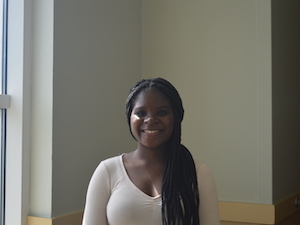 Mimi Avril | Central Baltimore Partnership
Mimi Avril | Central Baltimore Partnership
I found orientation to be joyous, challenging, demanding, and ponderous at the same time. The most challenging aspects included confronting my own biases and internalized prejudice. I always thought I was completely removed from having harmful biases towards Black and low-income communities as I am a member of these communities. However, the Wide Angle Youth Media presentation made me realize none of us are except from prejudice and bias and although my prejudices and biases might look different from others who are more privileged, I am still capable of having them. I’ve realized that I’m capable of having internalized and learned racism, and at every point I have to challenge these notions and be vigilant to the ways they might manifest with the way I interact with the way I interact with the Baltimore community. Although I am from a low-income Black community, I have realized that this identity is not a monolith; to hold these identities in Miami is not the same lived experience as holding them in Baltimore as both cities exists within their own histories and systematic and political spheres. Although I deeply identify with the Baltimore community, I realized I have to leave room for nuance in my relationship with it so that I learn from it and do not unintentionally perpetuate harm.
I enjoyed the opportunity to reflect throughout orientation a lot as it allowed me to lean on others in my group. Rather than sitting and feeling weighed down by the emotions that came up throughout presentations, the reflection groups provided an outlet to move through uncomfortable feelings so that I might make something out of them. In addition, I enjoyed all the activities that allowed me to play with and have fun with the other CIIP members. They became incredibly important and enjoyable for me as we moved through orientation as they brought joy and magic back into the space despite such heavy feelings and important topics.
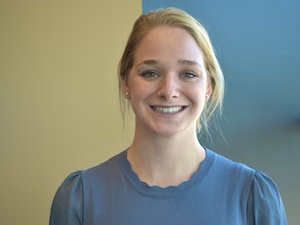 Kate Overbey | Greenmount East Leadership Project
Kate Overbey | Greenmount East Leadership Project
I’ve learned a lot this week about Baltimore, service, and myself. As someone who has lived in Baltimore for nearly two years, I thought I knew most of the city’s history, and that I had explored everywhere there was to see.
Over the last week, we’ve learned about the white L, and the black butterfly, and how the systemic disinvestment of West and East Baltimore rooted in racism and segregation has affected the communities we will be serving, from the past to present. Prior investment into highways and racially motivated zoning laws gave way to the current lack of affordable housing, access to food, and healthcare that affect neighborhoods throughout East and West Baltimore.
After Jessa’s presentation on Hopkins’ history with the Baltimore community, I was challenged by the contrast between the school that has done so much for me as an individual and also caused harm in the communities surrounding our campus. Hopkins has displaced and disrespected many members of the Baltimore community, and we have to decide how to enter these communities as Hopkins students coming from an institution that has personally touched the lives, positively or negatively, of most Baltimoreans.
In the discussions of our privilege as Hopkins students, we also had a really interesting workshop on identity, featuring how we can use our privilege as allyship and identify what we can do to build the communities we do identify with from within. Reverend Brown’s speech on privilege spoke to me, especially what he said about how your 20’s are about criticizing what is wrong, and pointing out all the injustices in the world, but the future is about creating the world you want to see.
I’ve really enjoyed getting to know my cohort and my peer mentor group this summer, as well as learning more about the program and the city and neighborhoods I will be working in with working for Greenmount East Leadership Project.
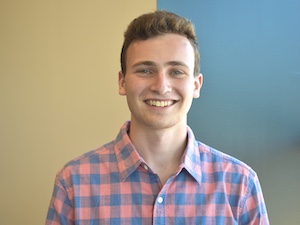 Will Polen | Neighborhood Design Center
Will Polen | Neighborhood Design Center
I began orientation a skeptic. Learning about community work while tucked away in the artificial comforts of Fast Forward U, stomach full of expensive R House, felt off-putting to me. We’d descended upon Hopkins-campus-extended to preemptively celebrate work we’d yet to do. Those first two days were fun and deeply informative, but I couldn’t shake the feeling that I was in an ivory tower — a far cry from where I’d be spending my next eight weeks.
That feeling really changed on Wednesday’s city-wide scavenger hunt. Though we spent much of the day in neighborhoods that are historically popular and “safe,” like Inner Harbor or Lexington Market, what will really stay with me was our stops in West Baltimore (both Upton and Penn North) — an area that’s been greatly disinvested and still not impacted by Hopkins’ economic “sphere of influence.” There, my identity as a white Hopkins student was most pronounced. I was an outsider, an embodiment of many residents’ deep resentment toward Hopkins and the city government. Though I’d felt disdain toward the comforts of Fast Forward U, I realized it had been a welcome space for me to learn what I’d eventually need to employ elsewhere; tools to gain residents’ trust.
In Upton, my peer mentor suggested we buy snowcones from a sidewalk vendor. Initially, I thought the idea was sort of futile. I was wrong. I quickly saw that an act as small as putting a few dollars into the local economy, talking to the vendor with curiosity and respect, went a long way. Whether I buy more snowcones or not this summer, that lesson will stay with me forever.
But not every difference or issue can be so easily reconciled. Later, up the street, a man asked a group of us where we were from. Though hesitant, my friend told him that we were Hopkins students. He waved his hand, sighed exasperatedly, and said “you’re in the wrong neighborhood.” Nothing we could say would undermine our presence as members of an institution this man resented. This lesson, too, will stay with me.
Because of that scavenger hunt, my next two days of orientation felt more grounded and imbued with purpose. I’ve gained a deep respect for Baltimore; I feel as if I’m ready to permeate past the Hopkins bubble in my work. I could not be more excited and humbled for this summer at the Neighborhood Design Center.
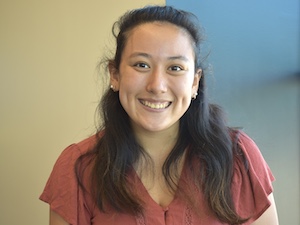 Cecilia Ramirez | Historic East Baltimore Community Action Coalition
Cecilia Ramirez | Historic East Baltimore Community Action Coalition
The first week of orientation could not have gone better for me, and I leave this week feeling refreshed, hopeful, and more prepared than even a week ago.
I really appreciated the different presentations from various speakers, with all these different topics and voices coming together to help guide and educate my role this summer. Hand in hand with these educational moments, the reflection sessions were also extremely valuable to me as I really got to digest what I was hearing, as well as hear what my peers were also experiencing throughout the week.
An experience that stands out to me from the past week was the scavenger hunt around Baltimore City. I had so much fun with my peer mentor group, but also really appreciated getting to go to some areas that I normally wouldn’t and experience the Baltimore transit system. I had no idea that there was a Subway in Baltimore, let alone ever use it. Another part of orientation that really stands out to me is the closing talk with Reverend Brown on leveraging our privilege. It was engaging and really left me examining closely who I am, and who I want to be in relation to the city I currently live in. This type of reflection just in the first week, kicking off the internship period, makes me excited that I will have a meaningful summer experience.
I think one theme that was especially apparent to me as the week closed was the way my identities have impacted, currently impact, and will impact, my role and relationship in and to Baltimore. As a Maryland native, but a Baltimore transplant, much of my relationship with Baltimore has been dictated by the voices around me. Coming to Baltimore for college, now an adult capable to make my own choices, I have the power to dictate who I choose to listen to and how. I am very excited to enter this summer with this ability, centered on reflection and intentional choices, and think that this summer will be amazing.
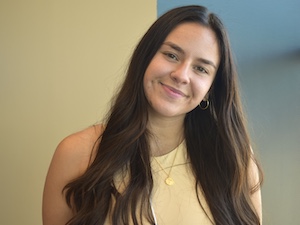 Laís Santoro | Pro Bono Resource Center
Laís Santoro | Pro Bono Resource Center
Orientation was definitely such an interesting experience, and it feels refreshing to be able to do it over again as a Peer Mentor, when last summer I did this experience as an intern. A challenging moment I think is always reckoning with the fact that we are associated with an institution that has done lots of harm and has been violent to many people in Baltimore, through various ways and projects. Jessa highlighted many of these, so did Lane in his presentation about the history of Baltimore, as well as other presenters. It’s not enough to just learn about these conscious acts, we must think about what that means for us and our work and our identities as we enter into working with our various placements. This is not easy. More specifically, the TAG workshop is always a little challenging or at least difficult. It forces you to sit and talk to people, to move your body in ways that may feel uncomfortable. It’s not hard for me to actively listen and speak up/ tell stories, but it’s hard for me to create images with my body to convey an emotion or thought especially in front of others. Also, there were some dynamics with someone in my peer mentor group that I need to talk to them about, with them taking up more space than they should have and so that’s weighing on me. Also, the scavenger hunt was not challenging, but there was a moment at the end of the day when someone asked us where we were from, found out it was from Hopkins, and said we were in the wrong neighborhood. It just makes me wonder how to change individual perspectives and do truly positive work. Also, I felt sick this week and ended up testing positive for COVID which was really unfortunate.
Despite that, I thought it was really fun!!! I loved learning more about my mentees, we already have plans to hang out next week outside of Bites and such. Some of the highlights include: figuring out a superhero name, meeting my supervisor in person, the entire scavenger hunt itself (and when Will thought that Missy Elliot was Billie Holiday from the scavenger hunt clues), mind-mapping, working at the Fast Forward U space and eating lunch / sharing space with new people, holding a leadership role and hearing how excited and deeply the mentees were thinking about their experiences, the speech by Rev. Brown, and so much more. It makes me really excited for the rest of the summer with the other peer mentors, with my placement, and to see the impact that we all make together.
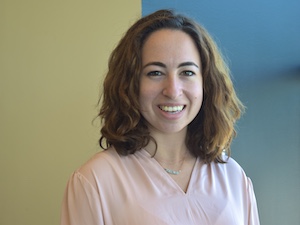 Lily Sheth | Neighborhood Housing Services of Baltimore
Lily Sheth | Neighborhood Housing Services of Baltimore
Going into orientation, I had no idea what to expect. I applied to CIIP on a whim based on the Life Design Lab’s recommendation without knowing much about the program or anyone who had previously participated. I wanted to continue living in Baltimore this summer and have the opportunity to get out of the “Hopkins Bubble”, as well as explore the issues of urban housing and transportation. The Hopkins-sponsored CIIP seemed like the perfect way to achieve these goals without pushing myself too far outside of my comfort zone.
Wow, was I wrong. From the very first day of orientation, I was pushed out of my comfort zone in almost every way to gain a deeper understanding of myself, my community, and the city of Baltimore, and how all three interact through the lens of my identities, privileges, and goals. Through conversations with guest speakers, peer mentors, and the cohort, I began to unpack my reasons for applying to CIIP: why I feel so strongly about living in Baltimore, the systems that created and maintain the “Hopkins Bubble”, and the resilience and strength of Baltimore communities experiencing disinvestment and racism.
Jessa Wais’ talk about the complex relationship between Hopkins and Baltimore was especially transformative for me and helped me gain perspective on the work that I have been and will be doing throughout this summer and beyond. I was drawn to Baltimore because of Hopkins and the opportunities it allows me as a student-athlete, a scholar of public health, a researcher, and an independent daughter seeking a new environment. However, Jessa eloquently pointed out that the opportunities that I have the privilege to enjoy as a white, upper-middle class, cisgender woman have come at the expense of the reasons I want to stay in Baltimore: its many neighborhoods, complicated history, small-town feel, and beauty. This realization led to guilt over my own privilege and made me question if I am the “right” person to be serving Baltimore communities.
While this guilt has not subsided, the folks from the CSC, Theatre Action Group, CIIP alumni, and Rev Brown were integral in helping me reframe passive feelings of guilt into intentional, thoughtful action this summer. There is no “right” person to be embarking on community work. Everyone has some type of privilege over others, some advantage– that is what makes us unique. The trick is to not let that privilege freeze us into inaction out of a fear of not belonging or making a mistake. We must leverage our privilege and our strengths to question our motivations, our position in our communities, and ultimately enact systematic change.
